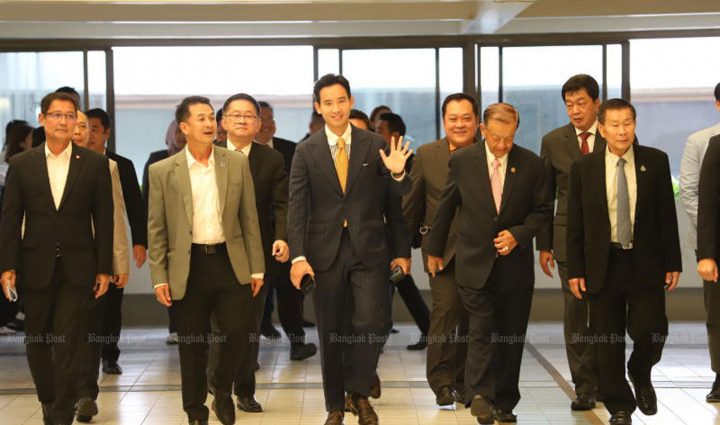Rumours of rivals ‘paying’ to form govt

The eight prospective coalition parties are expected to discuss a contingency plan at a meeting on Thursday if they cannot proceed with the formation of a government, according to Pheu Thai secretary-general Prasert Chantararuangthong.
Asked if Pheu Thai had a backup plan in case the Move Forward Party (MFP) cannot form the government, Mr Prasert said: “If necessary, the issue may be raised at a meeting on June 29, the day the eight-party coalition will have a meeting.”
“After the selection of the House speaker, the next step is to select a prime minister. We may have to discuss the matter carefully, particularly the number of MPs who support [each candidate],” Mr Prasert said.
Asked about a rumour that a substantial sum of money would be paid to renegade MPs in certain parties in exchange for their support during the vote on the House speaker or the vote for a prime minister, Mr Prasert said: “It will not be easy this time because democracy has progressed considerably.
“In previous elections, renegade MPs could not make it back into parliament,” he said, adding that Pheu Thai never grants its MPs a free vote on important issues such as the selection of the House speaker.
The rumour mill went into overdrive recently about a move by rival parties to form a government and usurp the eight-party coalition led by the MFP by paying to lure the support of renegade MPs.
Responding to the rumour that about 60 renegade MPs would be paid 100 million baht each in exchange for their support, Bhumjaithai Party leader Anutin Charnvirakul said: “People [in their right mind] wouldn’t pay.”
Asked whether Bhumjaithai would join a coalition government led by Pheu Thai if the MFP fails in its bid to form a government, Mr Anutin said that there had been no signs showing the MFP would fail so far.
He also said that Bhumjaithai had never even thought of joining a minority government.
Meanwhile, Phichai Ratnatilaka Na Bhuket, programme director for politics and development strategy at the National Institute of Development Administration (Nida), said that Mr Pita stands a good chance of becoming the next prime minister.
He said that when 500 MPs and 250 senators convene to select a PM, should Mr Pita fail to secure the support of more than half, or 376 lawmakers, the eight-party coalition must try to gather the backing of other parties.
If that support is still not enough, Pheu Thai will have the legitimacy to form a government, Mr Phichai said.
However, he said the Democrat Party may become a decisive factor in deciding the fate of Mr Pita.
Mr Phichai said the Democrats would hold a general assembly on July 9 to select a new leader, and if Abhisit Vejjajiva, its former leader, is re-elected, it is likely that he will support Mr Pita to become the next prime minister.
Mr Phichai said he did not think Pheu Thai would try to oust the MFP to become the leader in forming a government as this would hurt the party’s reputation.
Olarn Thinbangtieo, a political science lecturer at Burapha University, echoed the view, saying he did not think a minority government was a possibility, particularly as the sums quoted to secure the support of renegade MPs were not worth paying.
“A minority government will lack political legitimacy and could not run the country. It also remains to be seen whether Pheu Thai will stick with the eight-party coalition or change sides,” Mr Olarn said.
Writing on Facebook on Monday, former senator Paisal Puechmongkol said that the plot to buy renegade MPs had been aborted because Mr Anutin refused to join a minority government, and the Democrats appear to support Mr Abhisit’s return as party leader.
Mr Abhisit is likely to uphold democratic principles by supporting a candidate from the party that won the most House seats in the election, Mr Paisal said.
His Majesty the King will preside over the state opening of parliament on July 3, and members of parliament will select the House speaker the following day, according to Senate Speaker Pornpetch Wichitcholchai.
After the selection of the House speaker, a joint sitting of the House of Representatives and the Senate is expected to convene on July 13 to select a new prime minister.

